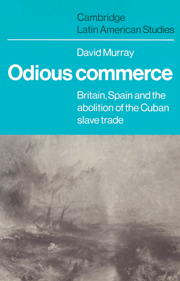Book contents
- Frontmatter
- Contents
- Tables
- Preface
- 1 The ‘opening’ of a legal trade
- 2 Parliament versus Cortes
- 3 Legality and illegality
- 4 The treaty of 1817
- 5 Enforcement and re-enforcement: the attempt to make the slave trade prohibition effective
- 6 The treaty of 1835
- 7 An abolitionist era
- 8 The Turnbull affair
- 9 The Escalera conspiracy
- 10 The penal law of 1845
- 11 Free trade and annexationism
- 12 The failure of the penal law
- 13 A new class of slaves
- 14 The abolition of the Cuban slave trade
- Abbreviations
- Notes
- Bibliography
- Index
- CAMBRIDGE LATIN AMERICAN STUDIES
- Frontmatter
- Contents
- Tables
- Preface
- 1 The ‘opening’ of a legal trade
- 2 Parliament versus Cortes
- 3 Legality and illegality
- 4 The treaty of 1817
- 5 Enforcement and re-enforcement: the attempt to make the slave trade prohibition effective
- 6 The treaty of 1835
- 7 An abolitionist era
- 8 The Turnbull affair
- 9 The Escalera conspiracy
- 10 The penal law of 1845
- 11 Free trade and annexationism
- 12 The failure of the penal law
- 13 A new class of slaves
- 14 The abolition of the Cuban slave trade
- Abbreviations
- Notes
- Bibliography
- Index
- CAMBRIDGE LATIN AMERICAN STUDIES
Summary
Spain's colonial empire saw the beginning and the end of the transatlantic slave trade. In one of the ironies of history, the abolition of the commerce in African slaves preceded the loss of Spain's last American possessions, reversing the process begun nearly four hundred years before when Spain's conquest of the Indies led to the beginning of the Atlantic slave trade. Even before the majority of Spain's American colonies received their political independence in the period 1810–25, the question of the African slave trade in Spain's overseas dominions involved mainly the plantation colonies, and particularly Cuba. Of Spain's once vast American empire only Cuba and Puerto Rico remained after 1825. Essentially then, the story of the abolition of the slave trade within the Spanish colonial empire is the story of the abolition of the slave trade to Cuba.
Cuba was an ideal colony for Spain as long as she could hold it. As the wealth of her largest plantation colony grew, Spain was able to cover the cost of Cuba's administration and the expenses of Spanish military forces stationed there from Cuban revenues. Throughout the nineteenth century Cuba was a very important market for Spanish exports and the carrying trade between Spain and Cuba fostered the growth of a Spanish merchant marine. But Cuba's importance to Spain was much more than that of a self-supporting colony and trading partner for the metropolis.
- Type
- Chapter
- Information
- Odious CommerceBritain, Spain and the Abolition of the Cuban Slave Trade, pp. ix - xiiPublisher: Cambridge University PressPrint publication year: 1981



